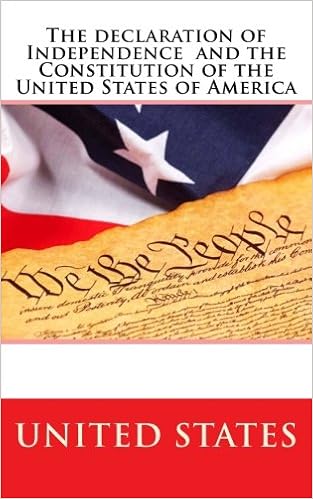A list of over 50 people who changed America and helped to influence the United States.
18th Century
Thomas Jefferson (1743-1826) was the principal author of the Declaration of Independence, which asserted rights and freedoms of American citizens. Thomas Jefferson passed the Statue of Religious Liberty for Virginia, which was an early right to give freedom of worship. Jefferson was president 1800-1808 and oversaw the expansion of American territory in the West.
(1743-1826) was the principal author of the Declaration of Independence, which asserted rights and freedoms of American citizens. Thomas Jefferson passed the Statue of Religious Liberty for Virginia, which was an early right to give freedom of worship. Jefferson was president 1800-1808 and oversaw the expansion of American territory in the West.

Benjamin Franklin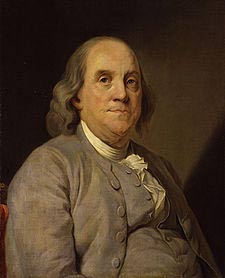 (1706-1790) played a key role in encouraging the diverse colonies to join together in the war of independence. He later served as American ambassador to France and helped to cement the new U.S foreign status. Franklin was also a polymath, who amongst other achievements showed lightning could conduct electricity.
(1706-1790) played a key role in encouraging the diverse colonies to join together in the war of independence. He later served as American ambassador to France and helped to cement the new U.S foreign status. Franklin was also a polymath, who amongst other achievements showed lightning could conduct electricity.



Nineteenth Century
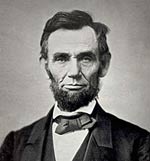 Abraham Lincoln (1809-1865) was US president 1861-1865. He led the union into a civil war to prevent a split between states in the north and south. During the war, Lincoln also promoted a bill to end slavery in the United States.
Abraham Lincoln (1809-1865) was US president 1861-1865. He led the union into a civil war to prevent a split between states in the north and south. During the war, Lincoln also promoted a bill to end slavery in the United States.
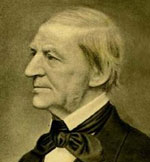 Ralph Waldo Emerson (1803 – 1882) was a leading poet, Transcendentalist and influential philosopher. He espoused no fixed doctrine but expanded on ideas of freedom, nature and the possibilities of man.
Ralph Waldo Emerson (1803 – 1882) was a leading poet, Transcendentalist and influential philosopher. He espoused no fixed doctrine but expanded on ideas of freedom, nature and the possibilities of man.
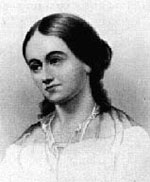 Margaret Fuller (1810 – 1850) was a leading proponent of women’s rights. She was the first woman to be editor of New York Tribune and wrote influential articles on books on women’s rights and progressive social policies.
Margaret Fuller (1810 – 1850) was a leading proponent of women’s rights. She was the first woman to be editor of New York Tribune and wrote influential articles on books on women’s rights and progressive social policies.
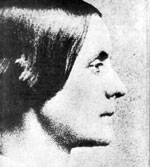 Susan B Anthony. (1820 – 1906) Anthony was a campaigner for civil rights and women’s suffrage. Anthony was one of the most influential women activists who helped secure women the right to vote.
Susan B Anthony. (1820 – 1906) Anthony was a campaigner for civil rights and women’s suffrage. Anthony was one of the most influential women activists who helped secure women the right to vote.
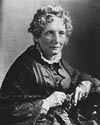 Harriet Beecher Stowe (1811 – 1896) – Author who helped popularise the anti-slavery movement. Her book ‘Uncle Tom’s Cabin’ depicted life under slavery and helped to mobilise public opinion in the North against slavery.
Harriet Beecher Stowe (1811 – 1896) – Author who helped popularise the anti-slavery movement. Her book ‘Uncle Tom’s Cabin’ depicted life under slavery and helped to mobilise public opinion in the North against slavery.


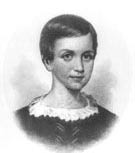 Emily Dickinson (1830 – 1886). One of America’s greatest female poets, Emily Dickinson’s themes of death and immortality became very popular and influenced the development of modern poetry.
Emily Dickinson (1830 – 1886). One of America’s greatest female poets, Emily Dickinson’s themes of death and immortality became very popular and influenced the development of modern poetry.

Twentieth Century

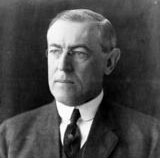 Woodrow Wilson (1856 – 1924) A president opposed to war; he finally took the US into World War One in 1917. After the war, it was Wilson who sought to establish a League of Nations and provide a framework for resolving international conflict.
Woodrow Wilson (1856 – 1924) A president opposed to war; he finally took the US into World War One in 1917. After the war, it was Wilson who sought to establish a League of Nations and provide a framework for resolving international conflict.
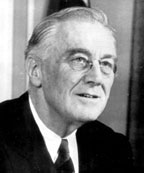 Franklin D. Roosevelt (1882 – 1945) US President from 1932 to 1945. F.D.R. was responsible for overseeing an expansion of the federal government has he sought to mitigate the effects of the Great Depression in the 1930s. Initially, he kept America out of World War Two although he supported Great Britain with material help. After Pearl Harbour, F.D.R. took the United States into war against both Germany and Japan.
Franklin D. Roosevelt (1882 – 1945) US President from 1932 to 1945. F.D.R. was responsible for overseeing an expansion of the federal government has he sought to mitigate the effects of the Great Depression in the 1930s. Initially, he kept America out of World War Two although he supported Great Britain with material help. After Pearl Harbour, F.D.R. took the United States into war against both Germany and Japan.


 Rosa Parks (1913 – 2005) In 1955, Rosa Parks became a principal figure in the US civil rights movement. Her refusal to give up her seat on a bus began the hugely influential Alabama bus boycott. She became an important figure in the US civil rights movement.
Rosa Parks (1913 – 2005) In 1955, Rosa Parks became a principal figure in the US civil rights movement. Her refusal to give up her seat on a bus began the hugely influential Alabama bus boycott. She became an important figure in the US civil rights movement.

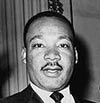 Martin Luther King (1929 – 1968) was the leading figure in the US civil rights movement during the 1960s. In 1963, his ‘I have a dream’ speech became a clarion call for an end to racism and segregation. He also became involved in opposing the Vietnam war and highlighting issues of poverty.
Martin Luther King (1929 – 1968) was the leading figure in the US civil rights movement during the 1960s. In 1963, his ‘I have a dream’ speech became a clarion call for an end to racism and segregation. He also became involved in opposing the Vietnam war and highlighting issues of poverty.
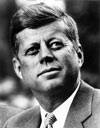 John F. Kennedy (1917 – 1963) John F. Kennedy was president for three years before his untimely assassination. He stamped his mark on America with his inaugural speech in 1961. He was the first Catholic president and presented a young and liberal face to America.
John F. Kennedy (1917 – 1963) John F. Kennedy was president for three years before his untimely assassination. He stamped his mark on America with his inaugural speech in 1961. He was the first Catholic president and presented a young and liberal face to America.
 Malcolm X (1925 – 1965) A radical alternative to Martin Luther King’s approach to civil rights. Malcolm X advocated a segregationist brand of the civil rights struggle.
Malcolm X (1925 – 1965) A radical alternative to Martin Luther King’s approach to civil rights. Malcolm X advocated a segregationist brand of the civil rights struggle.
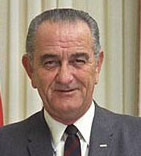 Lyndon Johnson (1908 – 1973) President from 1963-68. He oversaw the escalation of the Vietnam conflict, which proved very costly. He also implemented and passed civil rights legislation which made segregation illegal.
Lyndon Johnson (1908 – 1973) President from 1963-68. He oversaw the escalation of the Vietnam conflict, which proved very costly. He also implemented and passed civil rights legislation which made segregation illegal.
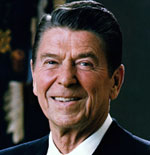 Ronald Reagan (1911 – 2004) As President he challenged the post-war consensus of Keynesian economics and welfare state, overseeing large tax cuts and a rise in defence spending. Reagan was president during a period of easing in cold war tensions with the Soviet Union.
Ronald Reagan (1911 – 2004) As President he challenged the post-war consensus of Keynesian economics and welfare state, overseeing large tax cuts and a rise in defence spending. Reagan was president during a period of easing in cold war tensions with the Soviet Union.
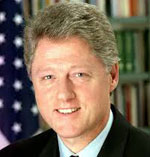 Bill Clinton (1946 – ) Presided over a period of economic prosperity and relative international calm between 1992-2000.
Bill Clinton (1946 – ) Presided over a period of economic prosperity and relative international calm between 1992-2000.
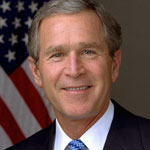 George W Bush Jr (1946 – ) President from 2000-2008. After 9/11 in 2001, he took the US to war in Afghanistan and Iraq.
George W Bush Jr (1946 – ) President from 2000-2008. After 9/11 in 2001, he took the US to war in Afghanistan and Iraq.
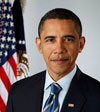 Barack Obama (1961- ) The first black US president. After only one year as president, he was awarded the Nobel Peace Prize in the hope he would be able to promote greater international co-operation.
Barack Obama (1961- ) The first black US president. After only one year as president, he was awarded the Nobel Peace Prize in the hope he would be able to promote greater international co-operation.

Other Modern Day Americans who changed the world
- Jesse Owens – (1935 – 1977) Winning gold medals at ‘Hitler’s’ Olympics in 1936 was an iconic statement against racial prejudice.
- Dwight Eisenhower – Supreme Allied Commander during D-Day landings and the Allied defeat of Nazi Germany. President from 1952-1960.
- General Patton – Charismatic General who helped with Allied victory in Europe, in particular turning back the Germans during the Battle of the Bulge.
- Ernst Hemingway – (1899 – 1961) American author Influential writer during 1920s and 1930s
- Eleanor Roosevelt (1884 — 1962) – First wife of Franklin D. Roosevelt, who campaigned for human rights.
- Muhammad Ali – (1942 – ) Boxer and civil rights activist
- Jacqueline Kennedy – Wife of assassinated JFK, become an iconic figurehead in her own right.
- Walt Disney (1901 – 1966) American film producer
- Neil Armstrong (1930 – 2012) US Pilot and first man on the moon
- Oprah Winfrey (1954 – ) Influential chat show host and media personality.
- Alfred Hitchcock (1899 – 1980) – Film producer
- Billie Jean King (1943-) Women’s tennis player. One of the most successful professional players. Billie Jean King helped women gain equal recognition in a male-dominated sporting arena.
- Hilary Clinton. (1947 – ) Wife of Bill Clinton. Senator and unsuccessfully ran against Barack Obama for Democrat nomination in 2008.
- Carl Lewis – One of the greatest Olympians
- Elvis Presley (1935 – 1977) defined the pop age. An icon who epitomised the age of the 50s and 60s.
- Michael Jackson (1958 – 2009) – American Pop singer
- Madonna (1958 – ) American Pop singer
- Bill Gates (1955 – ) Founded Microsoft. Bill Gates became the richest man in the world. His Microsoft operating system has become one of the most widely used products in the computer age.
Citation: Pettinger, Tejvan. “People who changed the US”, Oxford, UK. biographyonline.net, 23 February 2018.
The Constitution of the United States of America
The Constitution of the United States of America at Amazon
America – Teacher’s Edition
America – Teacher’s Edition at Amazon
Tales of Famous Americans
Tales of Famous Americans at Amazon
Periods in American history



 The Gilded Age (1870 to 1900) A period of rapid expansion in the economy, with growing inequality. Includes the great industrialists, such as J.D. Rockefeller, J.P. Morgan and Andrew Carnegie.
The Gilded Age (1870 to 1900) A period of rapid expansion in the economy, with growing inequality. Includes the great industrialists, such as J.D. Rockefeller, J.P. Morgan and Andrew Carnegie.




